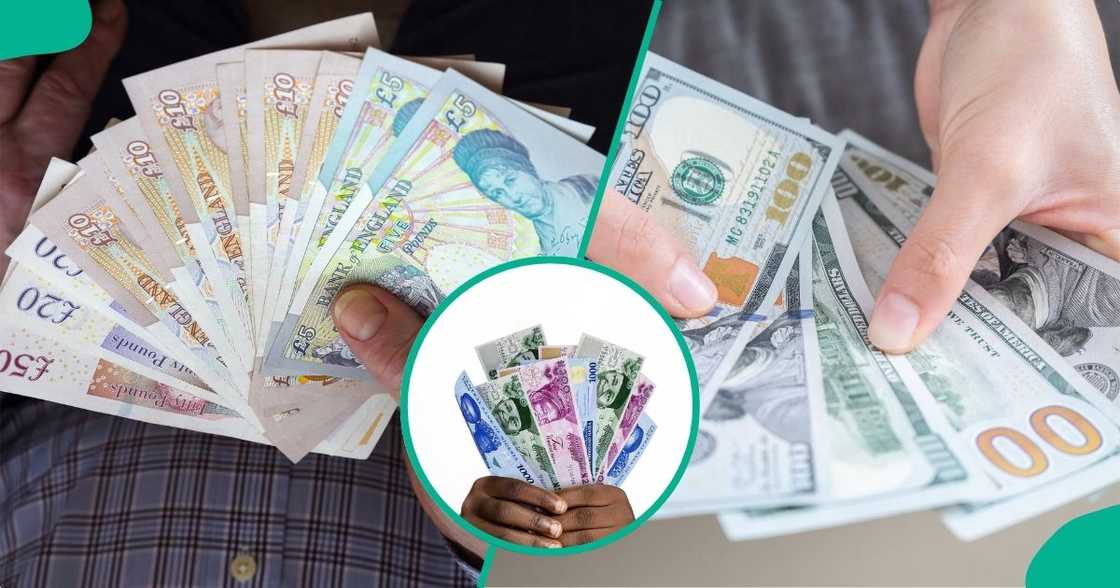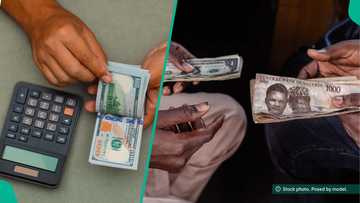Naira Depreciates again as Investors Pull Dollars amid US Threats
- The Nigerian currency has yet to recover from the threats of possible strike by the US in Nigeria
- Experts have said the threats may have scared investors who dumped the naira and pulled billions of dollars from the economy
- However, Nigeria’s external reserves have maintained an upward trajectory amid inflows from oil sales
Pascal Oparada is a journalist with Legit.ng, covering technology, energy, stocks, investment, and the economy for over a decade.
The Nigerian naira fell again on Tuesday, November 11, 2025, marking yet another round of depreciation against the US dollar as tensions in global markets intensified and investors moved funds out of Nigeria’s financial system.
The local currency, which has struggled to find firm footing in recent weeks, weakened further despite attempts by the Central Bank of Nigeria (CBN) to maintain stability.

Source: Getty Images
According to official data, the naira closed at a weighted average rate of ₦1,438.71 per dollar, compared to ₦1,435 the previous day.
The official trading window recorded an intraday high of ₦1,440.89 and a low of ₦1,436, showing mild but persistent downward pressure.
Investors pull back as geopolitical risks mount
In the parallel market, the naira traded around ₦1,440 per dollar, maintaining its fragile stance and reflecting ongoing disparities between official and street market rates.
Market watchers say the renewed weakness in the naira was driven largely by foreign portfolio investors repatriating their funds amid growing global uncertainty and the threat of potential US economic sanctions that could affect dollar liquidity in emerging markets.
Analysts believe these concerns have pushed investors to reduce exposure to riskier assets, including those in Nigeria.
“The recent outflow of foreign capital underscores a broader sentiment shift away from frontier markets,” said a Lagos-based economist.
“Until there’s more clarity on US policy direction, we may continue to see intermittent dollar shortages.”
Despite this, the Central Bank has maintained that the foreign exchange market remains liquid and resilient.

Read also
Eurobond: Massive boost for naira as experts predict Nigeria’s reserves to hit $45bn December
The apex bank recently announced measures to attract more inflows, including relaxing rules for exporters and increasing transparency in FX transactions.
External reserves edge higher, offering hope
In a rare positive turn, Nigeria’s external reserves recorded modest growth, rising to $43.366 billion from $43.348 billion a day earlier. The improvement, though marginal, is seen as a sign of steady inflows from crude oil exports and non-oil earnings.

Source: Getty Images
Experts say the buildup in reserves could help buffer the currency against future shocks, especially if the CBN continues its policy of defending the naira through strategic interventions.
Outlook: Stability possible but risks remain
While the naira’s recent dip signals lingering volatility, some analysts remain cautiously optimistic.
They point to improving non-oil export receipts, increased foreign investor participation, and stronger external reserves as factors that could support near-term stability.
However, sustained recovery will depend on the government’s ability to curb inflation, strengthen oil production, and restore investor confidence. Without these, the local currency could remain vulnerable to external shocks and speculative pressures.
For now, the naira’s journey remains uncertain, a reflection of Nigeria’s delicate balance between reform optimism and the harsh realities of global finance.
"The US threat against Nigeria is still hanging heavily over the country, affecting both stocks and the exchange rate," Janet Ogochukwu, senior banker and economist said.
According to her, investors have adopted a caution approach and remained on sidelines.
"So, this will definitely affect the exchange rate market and plunge the naira in the official window," she said.
Naira reacts, falls against USD
Legit.ng earlier reported the Nigerian naira closed the week ₦15 weaker against the U.S. dollar, weighed down by a surge in dollar demand and heightened investor anxiety following threats of U.S. military intervention in Nigeria by President Donald Trump over alleged Christian genocide.
The currency depreciated from ₦1,421.73 per dollar at the close of the previous week to ₦1,436.58 per dollar by Friday at the official window, reflecting a mild but symbolic retreat in the face of foreign exchange pressure.
Market analysts said the naira’s drop was largely driven by offshore investors exiting their positions in Nigeria’s financial markets after Trump’s controversial remarks sparked geopolitical jitters.
Proofreading by Kola Muhammed, copy editor at Legit.ng.
Source: Legit.ng




